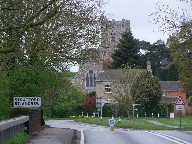| |
|
When
I first came this way twenty years ago, I found
this church in a dismal state. It had been
abandoned, and was succumbing to the elements. I
feared then that it would suffer the same fate as
Mickfield, which had
been similarly summarily abandoned. Happily, both
churches have been saved in quite different ways.
The village takes the form of its
name because Suffolk has two Stratfords. The
other, Stratford St Mary, is thirty miles down
the A12 and no relation. Stratford St Andrew sits
directly on the busy road, joined at the hip to
Farnham, the main village of the adjoining
parish. The tower is tall and plain, with simple
decorated bell windows. Their broken tracery
suggested to me in the 1990s that the tower has
been the subject of some structural movement. A
marvellous grotesque looks eastward over the
roofs towards Farnham church on the next hill.
I
saw inside in the 1990s, and found it all dully
Victorian, a middle-brow lukewarm ritualist
restoration from the 1870s. At some point, a
plywood tympanum had been installed in the
chancel arch, with curtains below, presumably to
create a smaller space for worship. A skein of
dust veiled everything. Someone else had been
inside recently; a Sainsbury's carrier bag lay on
a dirty pew, an interloper from the living world.
I came back in 2001 and found that I couldn't get
in, because there was a shiny new padlock on the
south door. Shortly afterwards, the church was
declared redundant.
It
stood empty for a number of years, but was
eventually sold with planning permission to
convert it into a private residence, thus
becoming perhaps the very last medieval church in
East Anglia that this would happen too - these
days, the dioceses tend to find less traumatic
solutions. There are skylights in the roof, and
everything is well-kept.
| When I thought back to
eleven years before, I remembered poking
about in the ugly vestry attached to the
north wall. Its windows had been smashed,
and the door was hanging off on its
hinges. Inside, the rusty hooks and a
scattering of coathangers were all that
remained, apart from an old open chest
abandoned on the floor. I thought to
myself that there could never have been a
right time to build this vestry on the
open side of the church; whatever could
they have been thinking of? Presumably an
off-the-peg job drawn up in some London
office. What a sad state of affairs. I
imagined the ruin the whole church might
become. But today, the
building has been saved, and as a private
house it stands more neatly and proudly
than it has for years. This outcome is a
good one for the building, for it could
not have survived otherwise. The constant
stream of traffic on the busy main road
would put me off living here. But I'm
glad somebody does.
|
|
 |
|
|
|

